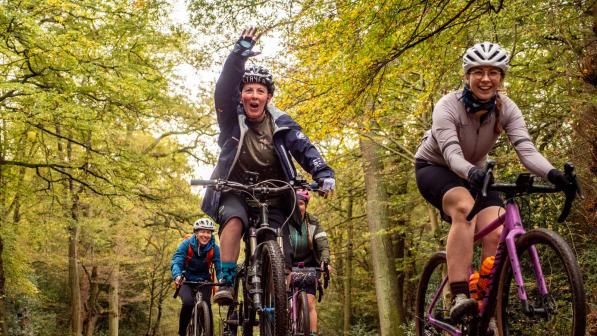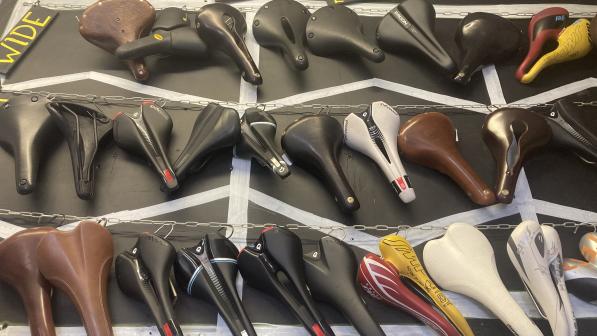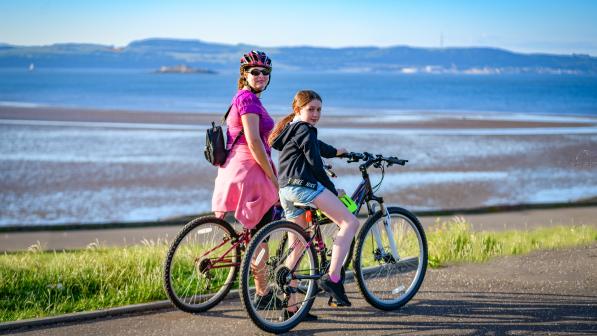Personal hygiene and keeping clean while touring or bikepacking

Bicycles gave the suffragettes independence of movement without chaperones and also helped usher us away from restrictive corsets and Victorian skirts. Fast forward from the late 19th century to the present day and we’ve cast off the pantaloons but the bicycle remains a firm favourite as a tool for freedom and independence.
When I was a teenager my bicycle was a way to get around; at university it meant free transport to and from lectures. Later, in my mid-20s I discovered bikepacking and my bicycle opened up a whole new world of exploration and self discovery.
From expeditions through the Julian Alps to popping off to Wales for the weekend, I’ve learned that enjoyment on a trip hinges on taking good care of myself. Not just feeding and watering but also health and hygiene.
While I found it relatively easy to find information on hot topics such as choice of gearing or tyres, it was harder to find a safe space to to discuss and learn about more intimate matters. Rather than feeling sheepish about tending to our nether regions on a bike ride we should feel proud! After all, it’s our undercarriage which sits on the bike all day long enduring and enabling our adventures.
While I found it relatively easy to find information on hot topics such as choice of gearing or tyres it was harder to find a safe space to to discuss and learn about more intimate matters
Dr Eleanor Jaskowska
What to do when I need the toilet? How to prevent saddle sores? What to do if I get my period? To give these important topics some air I spoke to some dyed-in-the-merino-wool adventurers and health experts to bring together our experiences and learnings.
We are all individuals, which is wonderful! My advice is not to take what one person says as gospel but to seek out lots of different experiences and solutions in your own quest.
And keep learning. Jenny Graham is an experienced hand when it comes to bikepacking and she’ll be the first to admit that she’s still learning: “Every trip I go on I learn something new about my systems, what I may be able to leave at home next time and things I just can't live without.”
The three Ps (pees, poos and periods)
When weeing in the wild growing up I would always just drip and air dry. When pedalling across Europe in the Transcontinental Race, however, I found this wasn’t sufficient as the urine left on my skin would burn and eventually lead to a UTI.
While some have perfected the ‘step, step, shimmy’, I’ve experimented with better solutions for cleaning my skin after a wild wee from a wet wipe to a quick jet of water from my water bottle. Reusable ‘pee rags’ are popular in the hiking world, but don’t seem to have trickled through into the female cycling community.
Wild poos are even more embarrassing! But there’s no shame in them, even the Queen/Britney/Michelle Obama needs to poop! Best practise is to take some poo bags with you and pack up your business.
If you do get caught out, a trusty trowel is all you need for peace of mind. Tor more tips on minimising your impact on the countryside, see Cycling UK’s advice on how to leave no trace.

As with all toilet-related matters in the backcountry, remember to do your business well away from any water sources and take everything home with you – especially dirty toilet paper and used pads or tampons. These items are treated with chemicals or contain materials that do not decompose.
Which brings us to our third ‘P’ for periods. Whether you embrace them, delay them or opt for a long-lasting contraceptive that leaves you without them, how you manage your bleed is an important detail for any trip.
On this topic I sought expert advice from Baz Moffat and her colleagues at The Well. They are providing fact, breaking taboos and giving women the knowledge to get active, train more and improve their performance.
“Tracking the cycle and becoming in tune with when your period will arrive puts you in a much stronger position when it comes to improving the experience of your cycle and often means that women don’t need to resort to hormonal manipulation of the cycle,” advises Baz.
Tracking the cycle and becoming in tune with when your period will arrive puts you in a much stronger position when it comes to improving the experience of your cycle
Baz Moffat, The Well
The obvious question for those women who do tune into their cycle is how to manage their bleed on a bike ride.
Menstrual cups (if you can use them) are popular because they’re reusable and don’t need changing as often as other methods.
Katherine Moore is a total convert, but her tips for period hygiene can apply to any sanitary method. “Take advantage of cafés and pubs en route – not just for sampling local delights, but there’s usually a public loo. You have a bit more privacy to wash everything out thoroughly,” she recommends.
If you are caught short in the wild make sure you take extra water so you have some for cleaning. It’s really important to wash your hands well before and after to avoid infection.
Baz also advocates for being prepared: “Sort out your period products – make sure you have enough, or know where you can get supplies, and if you use period underwear or menstrual cups, also consider if you will have access to places to clean them. Also take alternatives – when Jenny Graham cycled around the world there came a point where she just couldn’t use tampons, which were her chosen method of period management!”
If you do find yourself with spare tampons Vedangi Kulkarni has a great alternative use for them: “I put a tampon at the bottom of my food pouch to absorb any moisture and stop fruit from getting mouldy.” Just remember that you put it in there!

For those who want to delay their period for a week or so to avoid that much-anticipated touring holiday or bikepacking event, you may choose to take two months of your combined pill back to back. If that isn’t an option you can ask your GP about Norethisterone, a synthetic progestin that stabilises the endometrium (the uterus lining) and stops it breaking down.
“It is commonly used to ‘postpone a period’ for about a week or so,” explains Baz. “There are very few side effects; however, whenever taking any medications, especially hormones, there can be some hormonal side effects. If you are planning on taking a medication before an event make sure you have tried it before and know what to expect.”
Another option is an intrauterine device or IUD, commonly called a coil.
“There are two main types of IUD,” Baz clarifies. “The copper coil and the hormonal coil. The copper coil allows periods to continue.
“The hormonal coil (also known as the mirena coil) is very popular because it ticks two main boxes: reliable contraception for five years; treatment for heavy periods – by keeping the endometrium lining thin it keeps it in a very healthy state for five years and most women find that they have very light, infrequent periods or no periods at all.
“It can be the progesterone component of HRT if a woman is perimenopausal. All she would need in addition to her coil is some oestrogen.”
Hormonal health
My main take away from Baz and her colleagues at The Well is that period hygiene is not synonymous with hormonal health.
Period hygiene is not synonymous with hormonal health
Dr Eleanor Jaskowska
“We call tracking your cycle a woman’s super power,” says Baz. “If you know how the different phases make you feel then you can anticipate how you are going to feel on different days and this is very empowering for women.
“It also helps you figure out the things you might need to do or avoid to help ease symptoms. For example, caffeine or processed food in the lead up to your period can make symptoms worse for some women or knowing that there are some days of your cycle where you will need more rest after heavy exercise will allow you to have the best experience.”
To this end Baz also recommends finding a small window of time in your day to minimise stress. “Focus on the four pillars of health for the best hormone health. These are nutrition, exercise, stress and sleep. Make sure there is time booked in to every day for reducing stress or for rest. For example, daily meditation or yoga even just for 10 mins.”
Keep things clean

We have all become accustomed to carrying around a small bottle of antibacterial hand gel. This is something that is worth adding to your touring or bikepacking kit as good hygiene is important for minimising infection and illness when on tour.
As well as keeping your hands clean, you will also want to keep your body feeling fresh which is easier said than done after several days, weeks or months on the road! Especially in hot and sweaty conditions, cleaning the salt from skin at the end of a long day becomes quite important.
If a shower is available at a campsite, service station or even public swimming pool then it’s generally worth taking the opportunity. Alternatively, if you’re somewhere where clean water is available you can splash yourself down or have a swim in a lake or river. I always find a wild swim is twice as refreshing than any other method as well as allowing me to gently move my joints.
However, water is often scarce which is when wet wipes emerge as a film favourite for that quick and convenient clean feeling. As we heard with tampons, multi-use is a popular concept in bikepacking and wet wipes are no different!
Jenny Graham first cuts up her wipes into four smaller pieces, helping them to go further but also giving her the smug feeling of preparedness before a big trip.
Her mini-wipes then have three uses: “To clean my chamois each night. This is better than water as it wont make them wet – I don’t have time to wait for shorts to dry. Toileting, again to keep my bum and in turn my chamois clean. And finally to clean my chain. OK, not technically hygiene, but I love it when your kit has a dual purpose!”
Director of the London Bike Kitchen and Chair of the Women of Colour Cycling Collective Jenni Gwiazdowski is another big fan of the humble wet wipe and has a hierarchy to get the most use out of a single sheet. “I use them three times: once for my face, then I wash my pits and bits, and then I use it as loo roll, and then it goes in a small plastic bag designated just for loo roll. Leave no trace!”
Just peachy
Bottoms are so important: they’re one of our main contact points on the bicycle. A sore or chafing bum can really put a damper on your trip.
“Don’t ever sleep in your chamois!” exclaims Katherine, as she remembers one night where she forgot to get changed out of her padded cycling shorts. “My bum hadn’t had a chance to dry out or breathe overnight and by the end of the following day I had arse chafe.”
Bottoms are so important: they’re one of our main contact points on the bicycle
Eleanor Jaskowska
At the end of a long day you might be tired. Maybe it’s cold and raining and you don’t feel like getting changed. But even if you just pull your shorts down around your ankles inside your sleeping bag your backside will thank you.
When it comes to creams and ointments, it is highly individual. Some swear by Vaseline or nappy rash cream like Sudocrem, while others prefer a medical grade moisturiser like Dermol500 or Double Base Gel.
If you want to really clue yourself up on creams, what to do with your pubic hair and saddle angles or how to maintain healthy vulva while cycling I highly recommend that this talk from Dr Jane Sterling at the London Bike Kitchen. I found the advice for moisturising more, particularly in menopause, to be really interesting and rarely discussed.
Natalie Corbet, the first transwoman to cycle the Pan-American Highway, shared some experiences of looking after herself as self care doesn’t stop for bike rides!
“As a transwoman who has had bottom surgery, I have some regular maintenance that I must do to keep my vagina in working order by manually dilating it on a weekly to biweekly basis. I often try to time this for when I am staying in a hostel or somewhere that isn’t a tent for ease of cleaning up.”
Perhaps as cyclists we have a tendency (I certainly do!) to obsess about our bottoms while overlooking other key areas of our female anatomy.
Baz’s top tip for a comfortable trip is to get a great fitting sports bra. She explains: “Breast movement is not only uncomfortable and sometimes painful, but it also can impact performance – you activate muscles differently and change your body position and the way you move when your breasts are poorly supported, and this all causes you to use more energy and for fatigue to start setting in earlier!”
Laundry

You now know how to keep yourself clean, but you also want to keep your gear clean. Jenny Graham cleans hers with a wet wipe; I tend to take two pairs of shorts with me, hand washing and drying one while wearing the other.
Sometimes you stay at a campsite or apartment with laundry facilities and it feels like such a treat! Again, you are the best judge of just how ‘dirtbag’ you’re willing to go.
If you are washing your clothes it can be hard to dry them properly. Resist the temptation to leave wet clothes out drying on your guy ropes overnight. “It may seem like a good idea but if the frost or dew comes they’ll just be wetter in the morning and also cold if it’s winter.” A member of the Steezy Collective speaking from experience there.
If you are on a road trip then you may be able to dry things off your luggage while you ride along whereas this won’t be an option on muddy off road expeditions. I have been known to use my bike as a washing line while stopping for lunch in a sunny spot!
Don’t sweat the small stuff
“It’s worth noting that luxury vs necessity comes down to the individual and I love that!” shares Jenny Graham.
It’s true! I learned pretty early on for myself that I would never leave home without lip balm. The wind and sun shreds my lips to the point where it’s uncomfortable to eat and drink.
Vera also reminds us that we are the best judges of what we need to take. “Don’t be embarrassed about carrying luxuries. Let yourself take what you think you need; you’ll hone your packing list over time.”
Preparation is key

There are so many resources out there for gear lists, kit grids and other advice on preparing for a trip. While not usually part of this conversation, hygiene and health considerations should also feature in your preparation.
“The main thing I would recommend,” said Baz, “is not to do anything new just before an expedition.”
As much as we know about our bicycles and how to replace brake pads or clean the chain, we should also know our contraception and our cycle.
While this article contains individual experiences and general advice, I hope that it helps you on your journey to freedom. Not just freedom on your bicycle exploring the countryside but also freedom from any pain, embarrassment, discomfort or unnecessary fatigue. Knowledge (and cake) is power.








